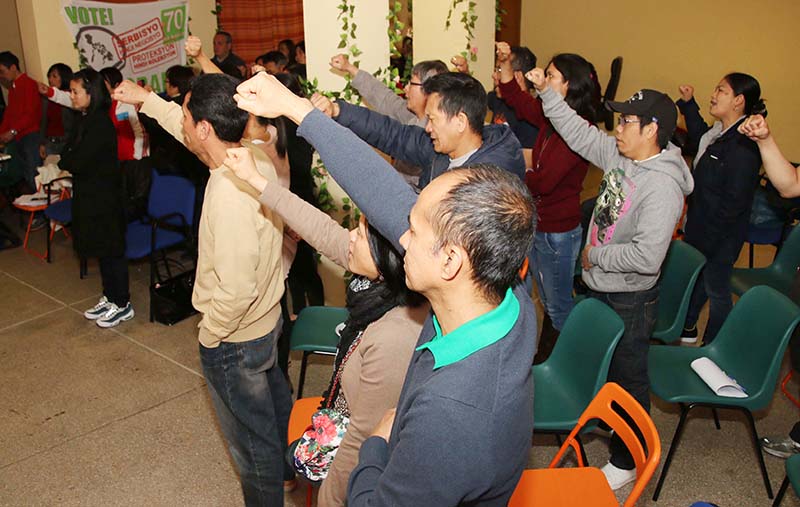Translations [ French» | Italian» | German» | Dutch» | Spanish» ]
(Rome, Italy) – The Founding Congress of Migrante Europe opened today at the Roma Camping Village in Rome, Italy, with a strong call to uphold migrants rights and for freedom to all political prisoners, in solidarity with the call in the Philippines.
Echoing the theme of the International Human Rights Day today “Stand up for human rights”, the delegates hoisted banners and slogans calling to free all political prisoners in the Philippines, upholding human rights and fighting for a just peace, as they stood in front of the stage and sang “Stand by Me” during the opening ceremonies.
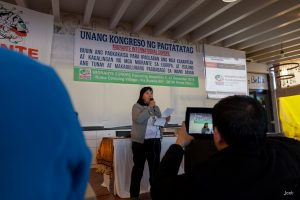 Weng Flores, Chairperson of Umangat-Migrante Rome, welcomed the Congress delegates and guests, and exhorted everyone to honor those who have offered their lives for the people, those migrants who sacrifice a lot to earn a living for their loved ones, and refugees who have lost their lives to escape wars and the political crisis in their countries.
Weng Flores, Chairperson of Umangat-Migrante Rome, welcomed the Congress delegates and guests, and exhorted everyone to honor those who have offered their lives for the people, those migrants who sacrifice a lot to earn a living for their loved ones, and refugees who have lost their lives to escape wars and the political crisis in their countries.
She underscored the fact that to be a migrant worker means working for long hours and doing jobs that are difficult, dirty and dangerous.
“Despite the great difficulties we face, we gave time to an important gathering of different representatives of various organizations who came from faraway countries in Europe. We sacrificed several work days just to be part of putting up our own alliance, the Migrante Europe,” Flores stressed.
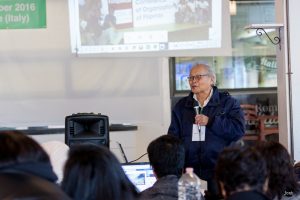 Asterio Palima, peace panel member of the National Democratic Front of the Philippines, gave the keynote speech during the Congress. He urged delegates to sound the strong call to free all political prisoners, which he said is in conjunction with the demands of justice and adherence to previous agreements between the NDFP and the Government of the Republic of the Philippines (GRP), especially the Comprehensive Agreement on Respect for Human Rights and International Humanitarian Law (CARHRIHL).
Asterio Palima, peace panel member of the National Democratic Front of the Philippines, gave the keynote speech during the Congress. He urged delegates to sound the strong call to free all political prisoners, which he said is in conjunction with the demands of justice and adherence to previous agreements between the NDFP and the Government of the Republic of the Philippines (GRP), especially the Comprehensive Agreement on Respect for Human Rights and International Humanitarian Law (CARHRIHL).
Palima traced the history of the resistance of the Filipino people against foreign domination. He also shared the history of the peace talks between the GRP and the NDFP, and stressed that the discussion and eventual agreement on a common document on social and economic reforms in the next round of talks in January 2017, is crucial because it seeks to address landlessness, poverty, underdevelopment, unemployment, and social inequality and injustice.
In a video message, Garry Martinez, Chairperson of Migrante International, said the founding of Migrante Europe and the advance of the progressive movement of Filipinos overseas are within the correct direction of fighting for migrant rights and welfare, and for fundamental issues in the homefront.
Martinez lamented, however, that the Duterte government has not made any substantial policy yet as alternative to the labor export policy, which has resulted in the commodification and exploitation of our compatriots abroad and in the Philippines.
Delegates to the Migrante Europe Founding Congress came from 18 countries and 23 organizations across Europe. They are expected to discuss and approve their Constitution and Program of Action, compose its Regional Council, as well as elect its Executive Officers, today until tomorrow.
French
(Rome, Italie) – Le congrès fondateur de Migrante Europe a eu lieu aujourd’hui au Roma Camping Village à Rome, Italie, avec un appel fort à respecter les droits des migrants et pour la liberté de tous les prisonniers politiques, en solidarité avec l’appel des Philippines.
Faisant écho au thème “Levez-vous pour les droits de l’homme” de la Journée Internationale des Droits de l’Homme ayant eu lieu aujourd’hui, les délégués ont hissé des bannières et scander des slogans appelant à libérer tous les prisonniers politiques aux Philippines, à la défense des droits de l’homme et à lutte pour une paix juste, alors qu’ils se tenaient sur une estrade en chantant “Stand by Me” lors de la cérémonie d’ouverture.
Weng Flores, Présidente de Umangat-Migrante Rome, a accueilli les délégués du Congrès et les invités, et a exhorté tout le monde à honorer ceux qui ont offert leur vie pour le peuple, ces migrants qui sacrifient tout pour gagner leur vie pour leurs proches, et les réfugiés qui ont perdu leurs vies pour échapper à la guerre et à la crise politique dans leurs pays.
Elle a souligné le fait que, pour être un travailleur migrant signe travailler de longues heures et faire des emplois difficiles, sales et dangereux.
“Malgré les grandes difficultés que nous rencontrons, nous avons donné de notre temps pour tenir cet important rassemblement de différents représentants de diverses organisations qui sont venus de pays lointains en Europe. Nous avons sacrifié plusieurs jours de travail uniquement pour faire partie et mettre en place notre propre alliance, Migrante Europe », a soulignée Flores.
Asterio Palima, membre du Comité de Paix du Front National Démocratique des Philippines, a prononcé un discours lors du Congrès. Il a exhorté les délégués à lancer un appel fort à libérer tous les prisonniers politiques qui, selon lui est en conjonction avec les exigences de la justice et le respect des accords antérieurs entre le NDFP et le Gouvernement de la République des Philippines (GRP), en particulier l’Accord Global sur le Respect des Droits de l’Homme et du Droit International Humanitaire (CARHRIHL).
Palima a retracé l’histoire de la résistance du peuple philippin contre la domination étrangère. Il a également partagé l’histoire des pourparlers de paix entre le GRP et le NDFP, et a souligné que les discussions et éventuel accord sur un document commun sur les réformes économiques et sociales dans le prochain cycle de négociations en janvier 2017 est crucial, car elle vise à adresser la question de l’absence de terre, de la pauvreté, du sous-développement, du chômage et des inégalités sociales et de l’injustice.
Dans un message vidéo, Garry Martinez, président de Migrante International, a déclaré que la fondation de Migrante Europe et l’avancement du mouvement progressiste des Philippins à l’étranger va dans le bon sens de la lutte pour les droits et le bien-être des migrants et pour les questions fondamentales dans leur pays d’origine.
Martinez a déploré, cependant, que le gouvernement de Duterte n’ai pas encore mis en place une politique qui serait une alternative à la politique d’exportation de la main d’œuvre, qui conduit à la marchandisation et à l’exploitation de nos compatriotes à l’étranger et aux Philippines.
Les délégués du Congrès Fondateur de Migrante Europe sont venus de 18 pays et 23 organisations à travers l’Europe. Ils sont venus pour discuter et approuver leur Constitution et leur Programme d’action, composer son Conseil régional, ainsi qu’élire ses dirigeants, d’aujourd’hui jusqu’à demain.
Italian
(Roma, Italia) -Il Congresso di fondazione Migrante Europa ha aperto oggi al Roma Camping Village a Roma in l’Italia, con un forte richiamo al rispetto dei diritti dei migranti e per la libertà di tutti i prigionieri politici, in solidarietà con la chiamata nelle Filippine.
Riprendendo il tema della Giornata internazionale dei diritti umani oggi “Alzati per i diritti umani”, i delegati hanno issato striscioni e slogan chiamando a liberare tutti i prigionieri politici nelle Filippine in difesa dei diritti umani e lottando per una pace giusta, mentre si trovavano di fronte al palco e hanno cantato “stand by Me”, durante la cerimonia di apertura.
Weng Flores, presidente del Umangat-Migrante Roma, ha accolto i delegati al Congresso e gli ospiti, e ha esortato tutti ad onorare coloro che hanno offerto la loro vita per il popolo, quei migranti che sacrificano molto per guadagnarsi da vivere per i loro cari, e rifugiati che hanno perso la vita per sfuggire dalle guerre e la crisi politica nei loro paesi.
Lei ha sottolineato il fatto che essere un lavoratore immigrato significa lavorare per lunghe ore e fare lavori difficili, sporchi e pericolosi.
“Nonostante le grandi difficoltà che abbiamo di fronte, abbiamo dato il tempo ad un importante raduno di diversi rappresentanti di varie organizzazioni che sono venuti da paesi lontani dell’ Europa. Abbiamo sacrificato diversi giorni di lavoro solo per essere partecipi di tirare su la nostra alleanza, il Migrante Europa “, ha sottolineato Flores.
Asterio Palima, membro di un partito della pace del Fronte Nazionale Democratico delle Filippine, ha dato il discorso chiave durante il Congresso. Egli ha esortato i delegati a enfatizzare la forte chiamata per liberare tutti i prigionieri politici, che ha detto, e’ in congiunzione con le esigenze della giustizia e il rispetto ai precedenti accordi tra l’NDFP e il governo della Repubblica delle Filippine (GRP), in particolare l’accordo globale sul rispetto dei diritti umani e del diritto umanitario internazionale (CARHRIHL).
Palima ha tracciato la storia della resistenza del popolo filippino contro la dominazione straniera. Egli ha anche condiviso la storia dei colloqui di pace tra il GRP e il NDFP, e ha sottolineato che la discussione e l’eventuale accordo su un documento comune sulle riforme sociali ed economiche nel prossimo round di colloqui nel mese di gennaio 2017, è fondamentale perché cerca di affrontare la privazione dei terreni, la povertà, il sottosviluppo, la disoccupazione e la disuguaglianza sociale e l’ingiustizia.
In un video messaggio, Garry Martinez, presidente del Migrante International, ha detto la fondazione di Migrante Europa e l’avanzata del movimento progressivo di filippini all’estero sono all’interno del corretto senso di lotta per i diritti dei migranti e il benessere, e per le questioni fondamentali nel fronte interno.
Martinez ha lamentato, tuttavia, che il governo Duterte non ha ancora fatto alcuna politica sostanziale in alternativa alla politica di esportazione del lavoro, che ha portato alla mercificazione e lo sfruttamento dei nostri connazionali all’estero e nelle Filippine.
I delegati al Migrante Europe Founding Congress provengono da 18 paesi e 23 organizzazioni di tutta l’Europa. Essi sono tenuti a discutere ed approvare la loro Costituzione e il programma d’azione, comporre il suo Consiglio regionale, così come eleggere i suoi Dirigenti, oggi fino a domani.
German
Der Gruendungskongress der Migrante Europe eroeffnete in Roma Camping Village in Rom, Italien mit einem starken Aufruf zur Wahrung der Rechte der Migranten und fuer die Freiheit alle politischen Gefangenen in Solidaritaet mit dem Aufruf in den Philippinen. Die heute das Thema des internationalen Menschenrechtstages widerspiegeln setzen sich fuer die Menschenrechts ein, unterhielten die Delegierten Banner und Slogans, die alle politischen Gefangenen auf den Philippinen befreien sollten, die Wahrung der Menschenrechte und der Kampf fuer einen gerechte Frieden als sie vor der Buehne standen und sangen “Stand by Me”waehrend der Eroeffnungsfeier.
Weng Flores, Stellvertreterin von Umangat, Migrante Rom begruesste die Kongressdelegierten und Gaeste und ermahnte alle, jene zu ehren, die ihr Leben fuer die Menschen geopfert haben, jene Migranten, die etwas opfern, um ihren Lebensunterhalt fiuer ihre Lieben zu verdienen und auch die Fluechtlinge, die ihr Leben verloren haben, um Kriegen jund der politischen Krise in ihren Kaempfen zu entkommen.
Sie unterstrich die Tatsache, dass ein Wanderarbeiter zu sein bedeutet Arbeitsplaetze mit laengeren Arbeitszeiten, Arbeit, die schwierig und gefaehrlich sind. “Trotz der grossen Schwierigkeiten, gegenueberstehen, gaben wir Zeit fuer eine wichtige Zusammenkunft von verschiedenen Vertretern verschiedener Organisationen, die aus fernen Laendern in Europa kommen. Wir haben mehrere Arbeitstage geopfert, nur zum Teil unserer eigenen Allianz zu werden, das “Migrante Europe” betonten Flores.
Asterio Palima forderte die Delegation auf, einen kraeftigen Aufruf zu erlangen, alle politischen Gefangenen zu befreien, die er in Verbindung mit den Forderungen der Gerechtigkeit und der Einhaltung frueherer Vereinbarungen zwischen NdF und der GRP, vor allem die Comprehensive Agreement on Respect for Human Rights and International Humanitarian Law (CARHILL).
Palima verfolgte die Geschichte des Widerstands der philippinischen Bevoelkerung gegen auslaendische Herrschaften. Her teilte auch die Geschichte der Friedengespraeche zwischen dem GRP und dem NDF mit und betonte, dass die Diskussion und eventuelle Einigung ueber eine gemeinsames Dokument ueber soziale und wirtschaftliche Reformen in den naechsten Gespraechen im Januar 2017 von entscheidender Bedeutung sind, die ueber Armut, Unterentwicklung, Arbeitslosigkeit und soziale Ungleichheit und Ungerechtigkeit v.erhandelt werden muss.
In einem Videobotshcaft, Garrz Martinez, Vorsitzxende von Migrante International, sage die Gruendung von Migrante Europe und den Fortschritt der fortschreitende Bewegung von Filipinos in Uebersee sind in die richtige Richtung der Kaempfe fuer Migrantenrechte- und Wohlfahrt und fuer die grundlegenden Fragen im Heimatfront.
Martinez beklagte jedoch, dass die Duterte Regierung keine wesentliche Politik alos Alternative zu der Arbeitsexportpolitik gemacht hat, die zur Komodifizierung und Ausbeutung von Landsleuten im Ausland und in den Philippinen gefuehrt hat.
Delegierte des Migrante Europe Grundungskongresses kamen aus 18 Laendernm und 23 Organisationen europaweit. Sie werden erwartet zu diskutieren und zxu genehmigen ihre Verfassung und Aktionsprogramm, seien Regionalrat sowie waehle seine Vorstaende von Freitag bis morgen.
Dutch
(Rome, Italië) – Het oprichtingscongres van Migrante Europe begon vandaag bij de Roma Camping Village in Rome, Italië, met een sterke oproep om migrantenrechten en de vrijheid voor alle politieke gevangenen te verdedigen, in solidariteit met de oproep uit de Filipijnen.
Met het thema van Internationale Mensenrechtendag om “op te staan voor mensenrechten”, hesen de vertegenwoordigers spandoeken en schreeuwde slogans voor vrijheid van alle politieke gevangenen in de Filipijnen, het verdedigen van mensenrechten en het vechten voor een rechtvaardige vrede, toen ze op het podium stonden en “Stand by Me” zongen tijdens de openingsceremonie.
Weng Flores, Voorzitter van Umangat-Migrante Rome, verwelkomde de vertegenwoordigers en gasten van het congres, en spoorde ze aan om iedereen die hun levens hebben verloren te eren, de migranten die heel veel hebben achter moeten laten om hun naasten te helpen met een inkomen, en vluchtelingen die hun levens hebben verloren om te vluchten van oorlogen en de politieke crisis in hun landen.
Zij onderstreepte het feit dat migrantenarbeiders lange uren moeten werken en banen hebben die moeilijk, vies, en gevaarlijk zijn.
“Ondanks de moeilijkheden waarmee wij worden geconfronteerd geven we aandacht aan een belangrijke bijeenkomst van verschillende vertegenwoordigers van allerlei organisaties van verre landen in Europa. Wij geven belangrijke werkdagen op zodat wij onze eigen alliantie kunnen opzetten, Migrante Europe,” benadrukte Flores.
Asterio Palima, vredespanel lid van het Nationaal Democratisch Front van de Filipijnen, gaf de keynote speech tijdens het congres. Hij riep vertegenwoordigers op om de campagne om alle politieke gevangenen te bevrijden te steunen, waarvan hij zei dat het in samenloop is met de eisen voor rechtvaardigheid en met het nakomen van voorgaande overeenkomsten tussen het NDFP en de overheid van de Filipijnen, vooral met de Comprehensive Agreement on Respect for Human Rights and International Humanitarian Law (CARHRIHL).
Palima schetste een geschiedenis van verzet van het Filipijnse volk tegen buitenlandse dominantie. Hij deelde ook over de geschiedenis van de vredesbesprekingen tussen de Filipijnse overheid en het NDFP, en benadrukte dat de discussie en eventuele overeenkomst van een gezamenlijk document rondom sociale en economische hervormingen tijdens de volgende ronde van de vredesbesprekingen in januari 2017, cruciaal is omdat het een eind aan landloosheid, armoede, onderontwikkeling, werkloosheid en sociale ongelijkheid en onrechtvaardigheid tracht te brengen.
In een videobericht zei Garry Martinez, voorzitter van Migrante International, dat de oprichting van Migrante Europe en de vooruitgang van de progressieve Filipijnse beweging overzee binnen de algemene richting is van het vechten voor migrantenrechten en welzijn, en voor de fundamentele kwesties van het thuisfront.
Martinez beklaagde de overheid van Duterte die nog geen substantieel beleid als alternatief voor het arbeidsexportbeleid heeft gevoerd, wat heeft geleid tot het commodificeren van de uitbuiting van onze landgenoten binnen en buiten de Filipijnen.
Vertegenwoordigers van het oprichtingscongres van Migrante Europe kwamen uit 18 landen en van 23 organisaties binnen Europa. Verwacht wordt dat zij vandaag tot morgen hun constitutie en actieprogramma gaan bediscussiëren en goedkeuren, een regionale raad samenstellen, en daarvoor de uitvoerende officieren kiezen.
Spanish
(Roma, Italia) – El Congreso Fundador de Migrante Europa se inauguró hoy en Roma, con un fuerte llamamiento por la defensa de los derechos de los migrantes y la libertad de todos los presos políticos, en solidaridad con el llamamiento en Filipinas.
Haciéndose eco del tema propuesto por el Día Internacional de los Derechos Humanos: “Alcémonos por los derechos humanos”, los delegados levantaron banderas y consignas que clamaban por la liberación de todos los presos políticos filipinos, la defensa de los derechos humanos y la lucha por una paz justa, al son de la canción “Stand by Me” durante la ceremonia de apertura.
Weng Flores, Presidenta de Umangat-Migrante Roma, dio la bienvenida a los delegados del Congreso y a los invitados, y exhortó a todos a honrar a quienes han puesto su vida al servicio de las personas, a los migrantes que sacrifican mucho para ganarse la vida y ayudar a sus seres queridos y a los refugiados que han perdido la vida al escapar de las guerras y la crisis política en sus países.
Subrayó el hecho de que ser trabajador migrante significa trabajar durante largas horas y aceptar empleos difíciles, sucios y peligrosos.
“A pesar de las grandes dificultades que enfrentamos, diferentes representantes de varias organizaciones de países europeos lejanos hemos hecho tiempo para asistir a este importante encuentro. Hemos sacrificado varios días de trabajo para formar parte de la creación de nuestra propia alianza, Migrante Europa “, afirmó Flores.
Asterio Palima, miembro del panel de paz del Frente Democrático Nacional de Filipinas- National Democratic Front of the Philippines (NDFP), pronunció el discurso de apertura durante el Congreso. Urgió a los delegados a hacer un llamamiento por la liberación de todos los presos políticos, lo cual, dijo, está en conjunción con las exigencias de justicia y la adhesión a acuerdos previos entre el NDFP y el Gobierno de la República de Filipinas (GRP), especialmente el Acuerdo Integral por el Respeto de los Derechos Humanos y el Derecho Internacional Humanitario (CARHRIHL).
Palima trazó la historia de la resistencia del pueblo filipino contra la dominación extranjera. También compartió la historia de las conversaciones de paz entre el GRP y el NDFP y subrayó que el debate y eventual acuerdo sobre un documento común en torno a reformas sociales y económicas durante la próxima ronda de conversaciones de paz, en Enero de 2017, es crucial ya que trata de abordar la pobreza, el subdesarrollo, el desempleo, la desigualdad social y la injusticia.
Mediante video conferencia, Garry Martínez, presidente de Migrante Internacional, afirmó que la fundación de Migrante Europa y el avance del movimiento progresista de los filipinos en el extranjero empoderan la lucha por los derechos y el bienestar de los migrantes y por cuestiones fundamentales frentes internos de la nación filipina.
Martínez lamentó, sin embargo, que el gobierno de Duterte no haya hecho todavía ningún avance político sustancial como alternativa a la política de exportación de mano de obra, que ha resultado en la mercantilización y explotación de nuestros compatriotas en el extranjero y en Filipinas.
Los delegados del Congreso Fundador de Migrante Europa vinieron de 18 países y 23 organizaciones de toda Europa. Se espera que discutan y aprueben su Constitución y Programa de Acción, que compongan su Consejo Regional, y que elijan a sus Oficiales Ejecutivos.
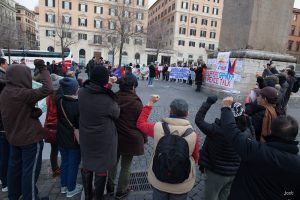 Filipino overseas workers led by Migrante chapters from Rome, Milan, Caserta, Firenze, Bologna, and Mantova were joined by leaders and members of the Italy-Friendship Association, Unione Sindicale di Base USB, Comitato Immigrati Italia, CARC and more than fifty members of the delegation of the National Democratic Front of the Philippines (NDFP) who are participating in the third round of formal peacetalks with the Government of the Republic of the Philippines (GRP) in Rome, Italy.
Filipino overseas workers led by Migrante chapters from Rome, Milan, Caserta, Firenze, Bologna, and Mantova were joined by leaders and members of the Italy-Friendship Association, Unione Sindicale di Base USB, Comitato Immigrati Italia, CARC and more than fifty members of the delegation of the National Democratic Front of the Philippines (NDFP) who are participating in the third round of formal peacetalks with the Government of the Republic of the Philippines (GRP) in Rome, Italy.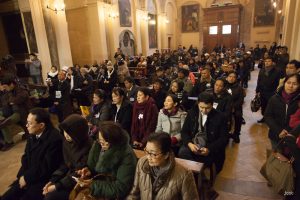 After the rally, a forum organised by Socio-Cultural and Sport Committee of Sentro Filipino in collaboration with Umangat-Migrante and other Filipino communities in Rome at the Basilica di Santa Pudenziana in Via Urbana 160, where more than 300 members of the Filipino community in Rome heard both the NDFP and GRP agenda in the peace process, including their views on migrants’ rights and concerns.
After the rally, a forum organised by Socio-Cultural and Sport Committee of Sentro Filipino in collaboration with Umangat-Migrante and other Filipino communities in Rome at the Basilica di Santa Pudenziana in Via Urbana 160, where more than 300 members of the Filipino community in Rome heard both the NDFP and GRP agenda in the peace process, including their views on migrants’ rights and concerns.
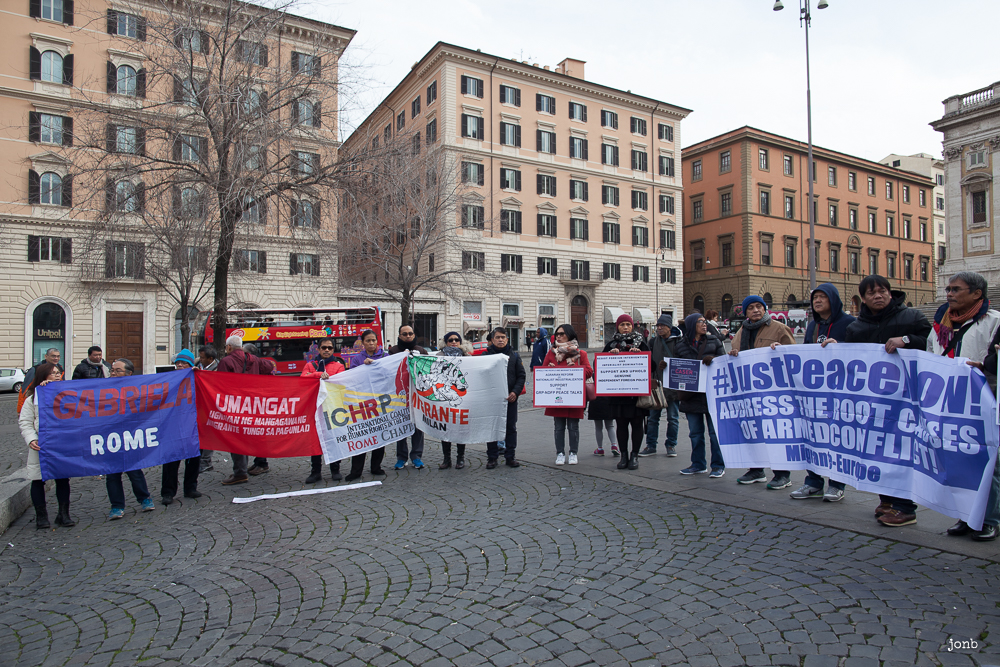
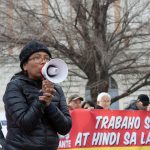
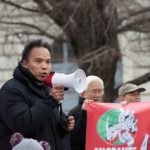

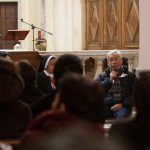
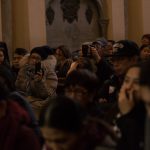
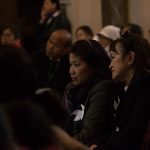
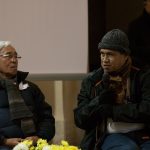
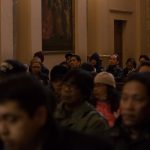
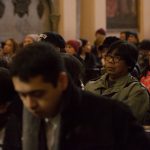
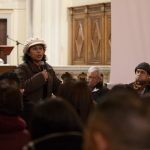
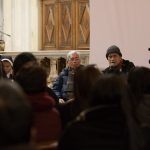
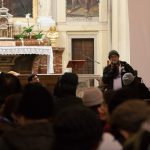
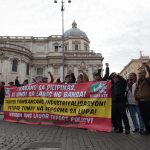

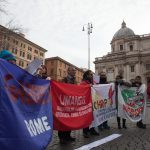
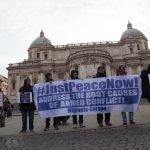
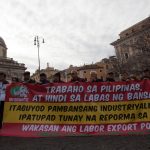
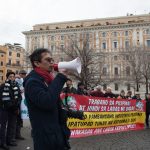
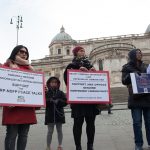
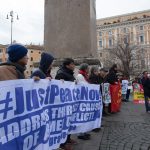
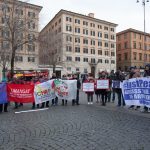
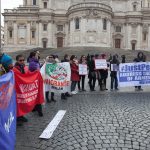
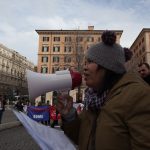

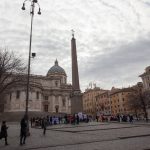
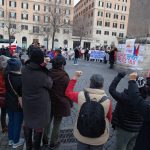
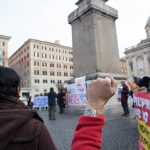
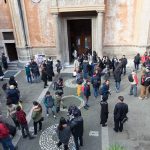
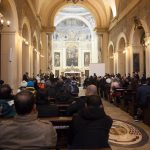

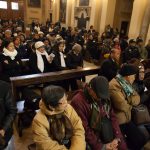
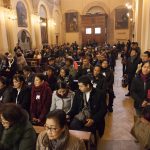
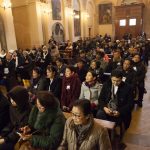

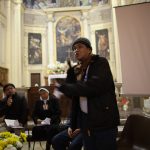
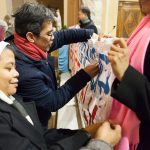
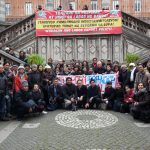
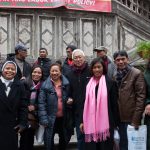
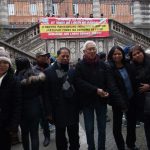
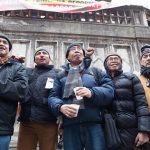
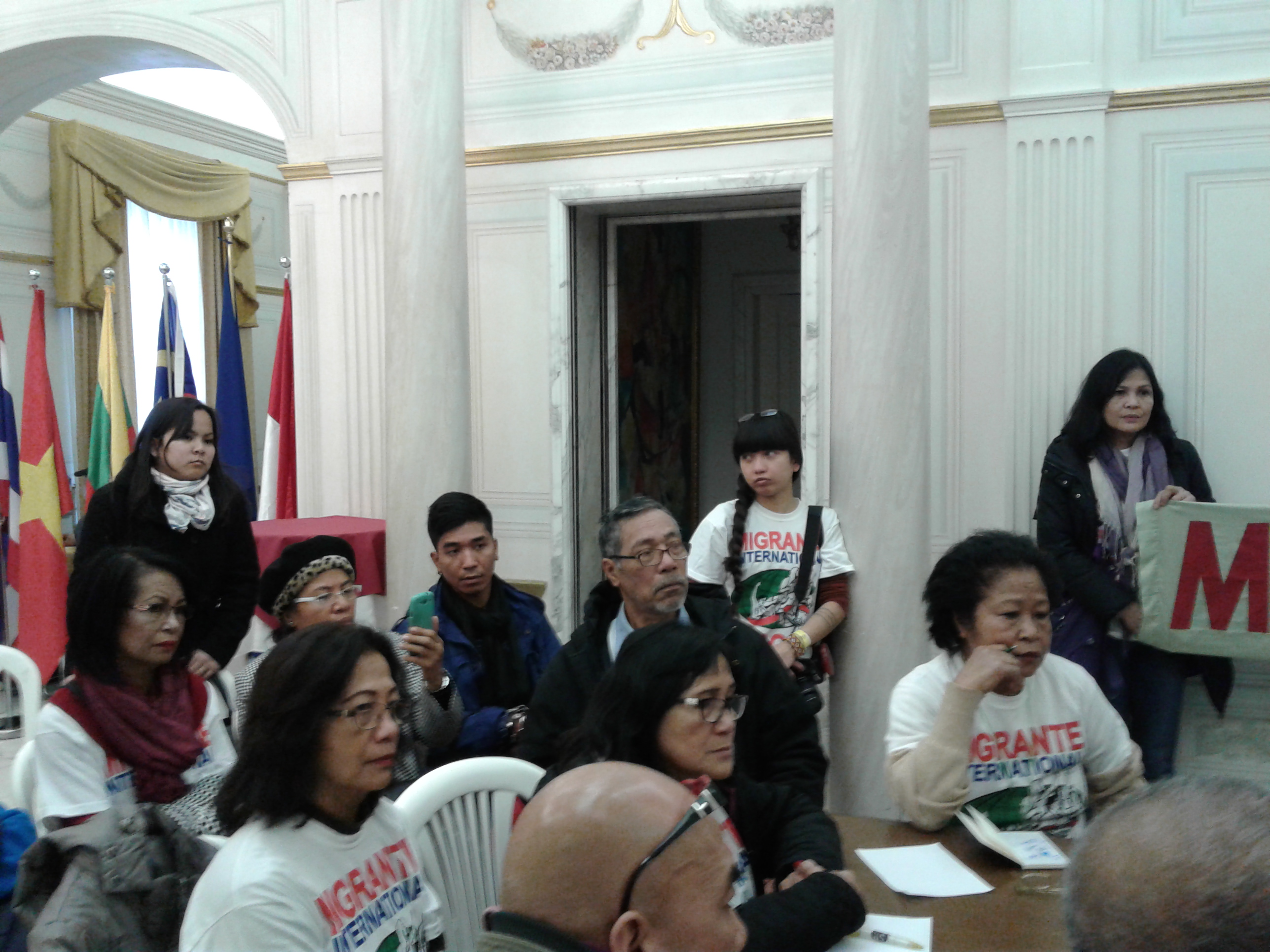
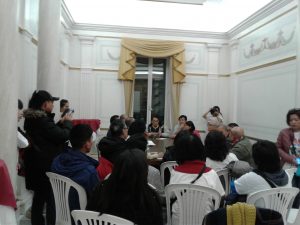
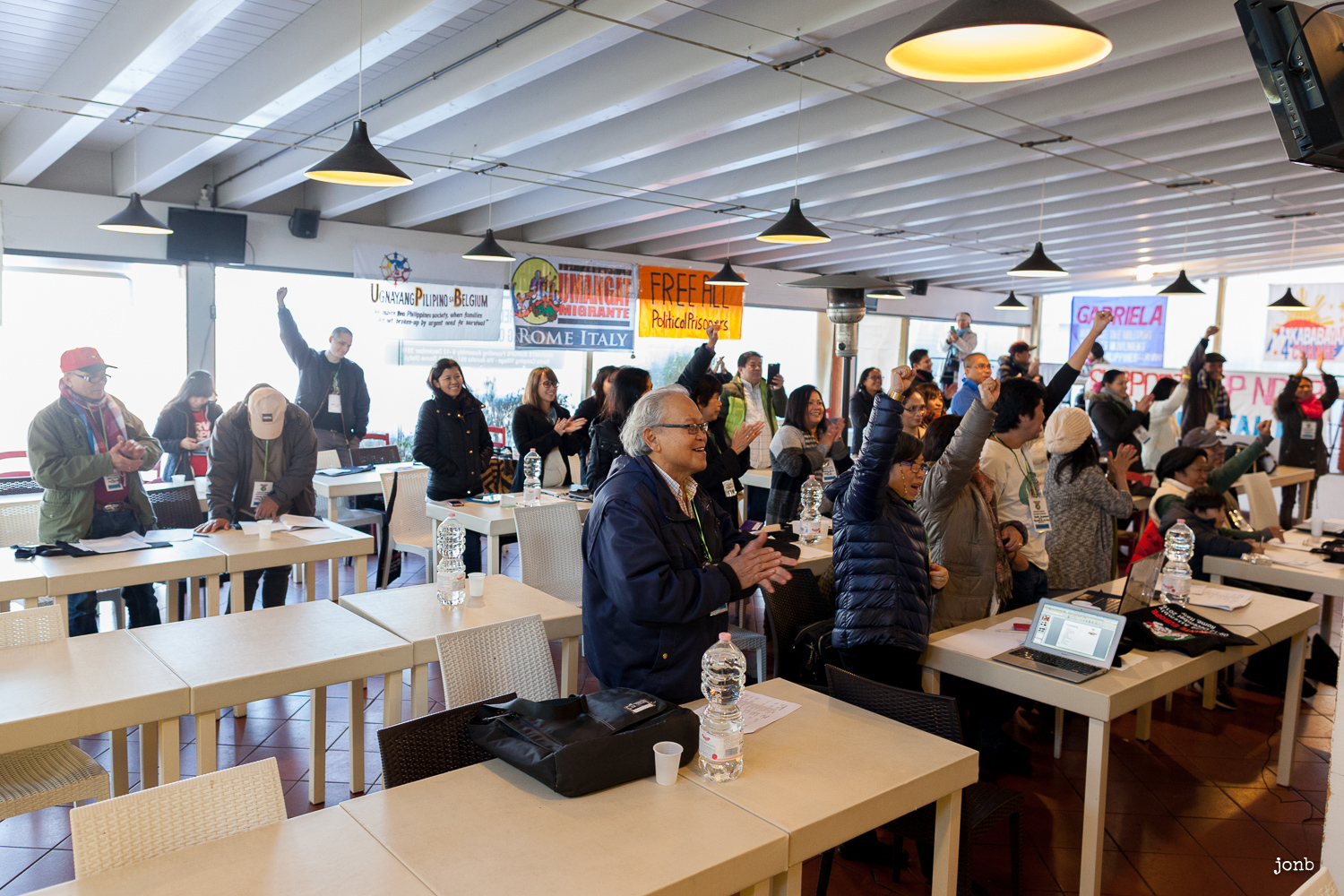
 Weng Flores, Chairperson of Umangat-Migrante Rome, welcomed the Congress delegates and guests, and exhorted everyone to honor those who have offered their lives for the people, those migrants who sacrifice a lot to earn a living for their loved ones, and refugees who have lost their lives to escape wars and the political crisis in their countries.
Weng Flores, Chairperson of Umangat-Migrante Rome, welcomed the Congress delegates and guests, and exhorted everyone to honor those who have offered their lives for the people, those migrants who sacrifice a lot to earn a living for their loved ones, and refugees who have lost their lives to escape wars and the political crisis in their countries. Asterio Palima, peace panel member of the National Democratic Front of the Philippines, gave the keynote speech during the Congress. He urged delegates to sound the strong call to free all political prisoners, which he said is in conjunction with the demands of justice and adherence to previous agreements between the NDFP and the Government of the Republic of the Philippines (GRP), especially the Comprehensive Agreement on Respect for Human Rights and International Humanitarian Law (CARHRIHL).
Asterio Palima, peace panel member of the National Democratic Front of the Philippines, gave the keynote speech during the Congress. He urged delegates to sound the strong call to free all political prisoners, which he said is in conjunction with the demands of justice and adherence to previous agreements between the NDFP and the Government of the Republic of the Philippines (GRP), especially the Comprehensive Agreement on Respect for Human Rights and International Humanitarian Law (CARHRIHL).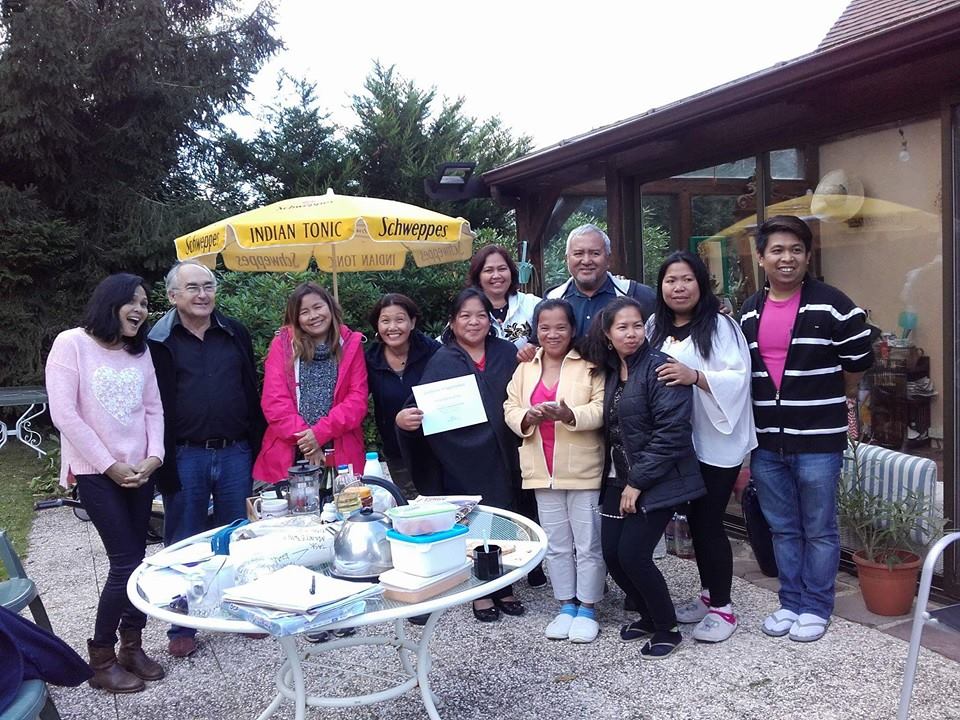
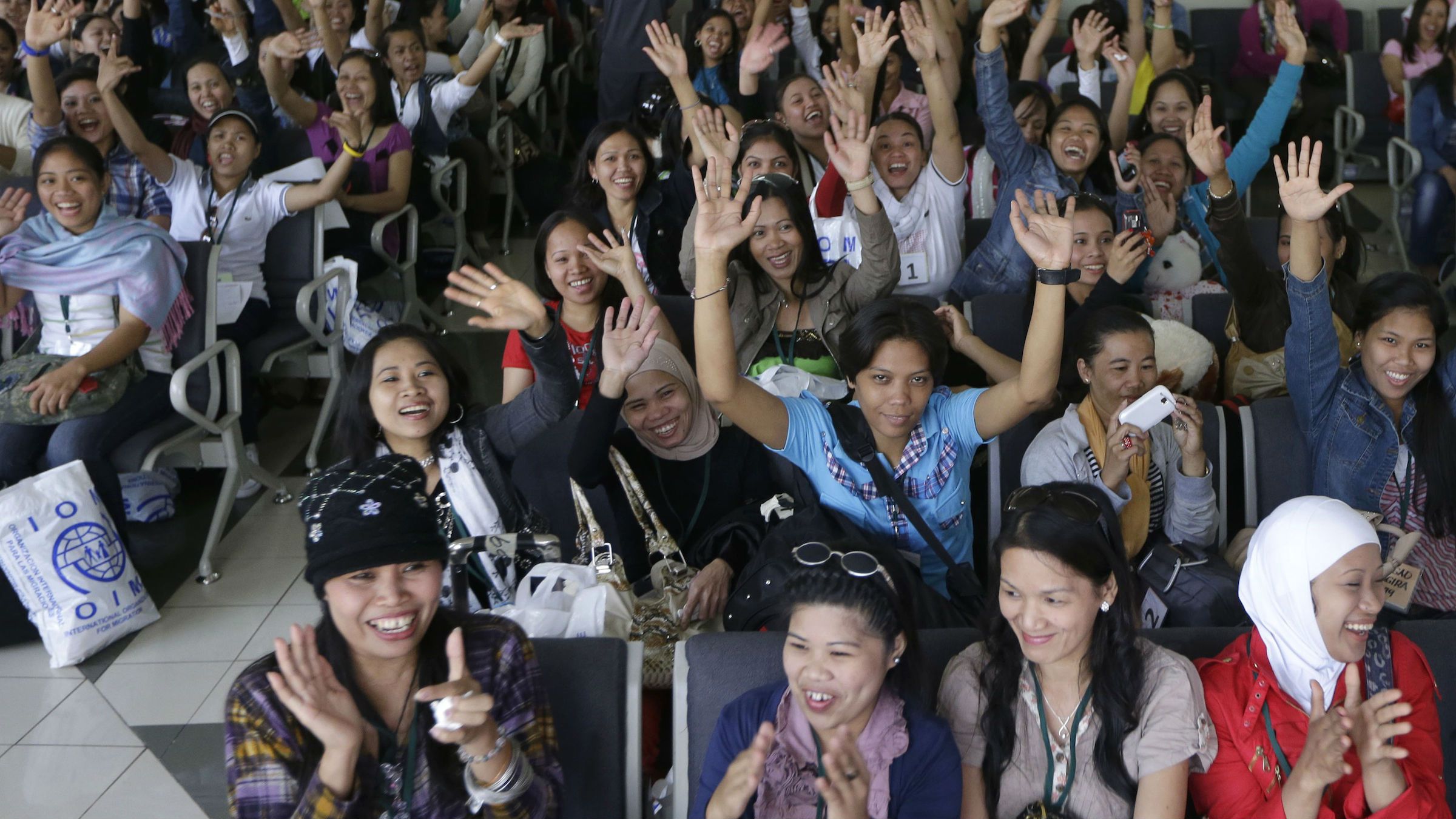
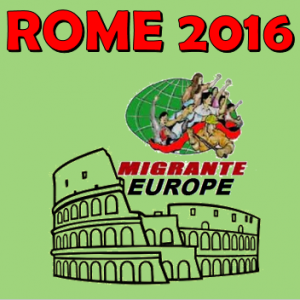 The founding assembly of Migrante International Europe will be attended and participated in by affiliate member organizations of Migrante International in Europe such as the different Migrante formations in Denmark, Belgium, The Netherlands, Switzerland, Austria, the UK, France and Italy, as well as many other Filipino migrant organizations. Filipino migrant formations of women, youth, professionals, cultural workers and church-based migrant advocates are also expected to join the alliance.
The founding assembly of Migrante International Europe will be attended and participated in by affiliate member organizations of Migrante International in Europe such as the different Migrante formations in Denmark, Belgium, The Netherlands, Switzerland, Austria, the UK, France and Italy, as well as many other Filipino migrant organizations. Filipino migrant formations of women, youth, professionals, cultural workers and church-based migrant advocates are also expected to join the alliance.
